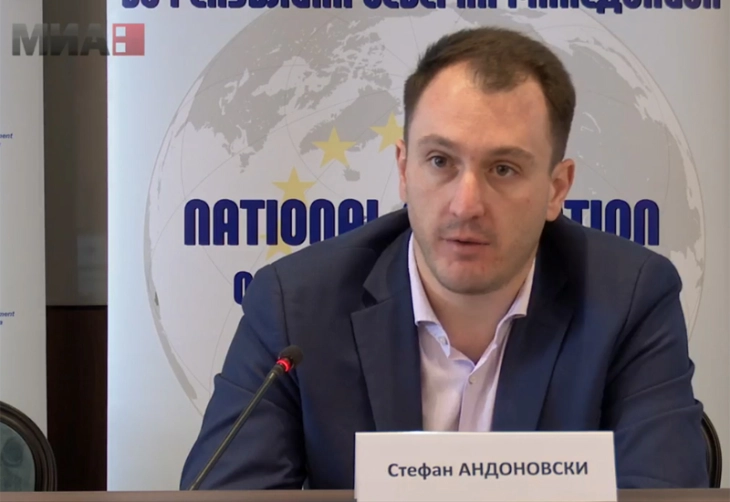Andonovski: Communication between institutions is the basis for digital transformation
- Minister of Digital Transformation Stefan Andonovski emphasized on Wednesday the need for a rationalization of expenses, development of clear guidelines for the digitization of each institution within the frameworks of the national standards, as well as intensive digitization of all registries and their connection to a unified environment for the exchange of data.
- Post By Angel Dimoski
- 12:13, 17 July, 2024

Skopje, 17 July 2024 (MIA) - Minister of Digital Transformation Stefan Andonovski emphasized on Wednesday the need for a rationalization of expenses, development of clear guidelines for the digitization of each institution within the frameworks of the national standards, as well as intensive digitization of all registries and their connection to a unified environment for the exchange of data.
Andonovski noted that the “Smart Macedonia” comprehensive government initiative envisages the drafting of a national ICT strategy that would act as an umbrella of all government activities and would be in accordance with the European Commission’s initiative on digital transformation titled “Europe’s Digital Decade” or digital goals for 2030, and will also be “in line with the commitments of our international partners”.
At the third session of Working Group 6 – Anti-corruption on the topic of building a cohesive digital infrastructure for the development of advanced public finance held by the National Convention on the European Union in the Republic of North Macedonia (NCEU-MK) on Wednesday, Minister Andonovski said the planned ICT strategy is expected to define clear goals, measures and activities in each of the four areas grouped in accordance with the digital compass – connectivity, digital skills, digitization of key government services and digitization of businesses.
Regarding the digital transformation, Andonovski stressed, it is key that the institutions communicate with each other through the national platform for interoperability, which, he said, despite being introduced in 2015, is only being used by 50 institutions today.
“We can’t speak of artificial intelligence, of tools for improving transparency, uncovering potential cases of corruption, if over 90 percent of the institutions keep their data on paper or exchange them with each other in the traditional way and aren’t connected in a single digital environment... The system exists, it’s there, but the institutions aren’t using it. This is the basis of all future steps, because we can’t speak of connectivity if the institutions don’t want to exchange data through the national interoperability platform,” Andonovski said in his address at the session.

He urged greater use of the opportunities offered to the citizens and businesses by the electronic services website uslugi.gov.mk. Instead of each institution having its own website, this single website should unite the services provided by the Government or the state for the citizens, Andonovski said.
Addressing international partners, Andonovski said despite their good intentions when donating digital tools to the country’s institutions, the donations are separate and the tools cannot communicate with each other, he said.
“One of our first efforts is to unify the assistance from our international partners and ensure it is carried out on the basis of the requirements that the European Union has of us,” Andonovski added.
Photo: Printscreen







